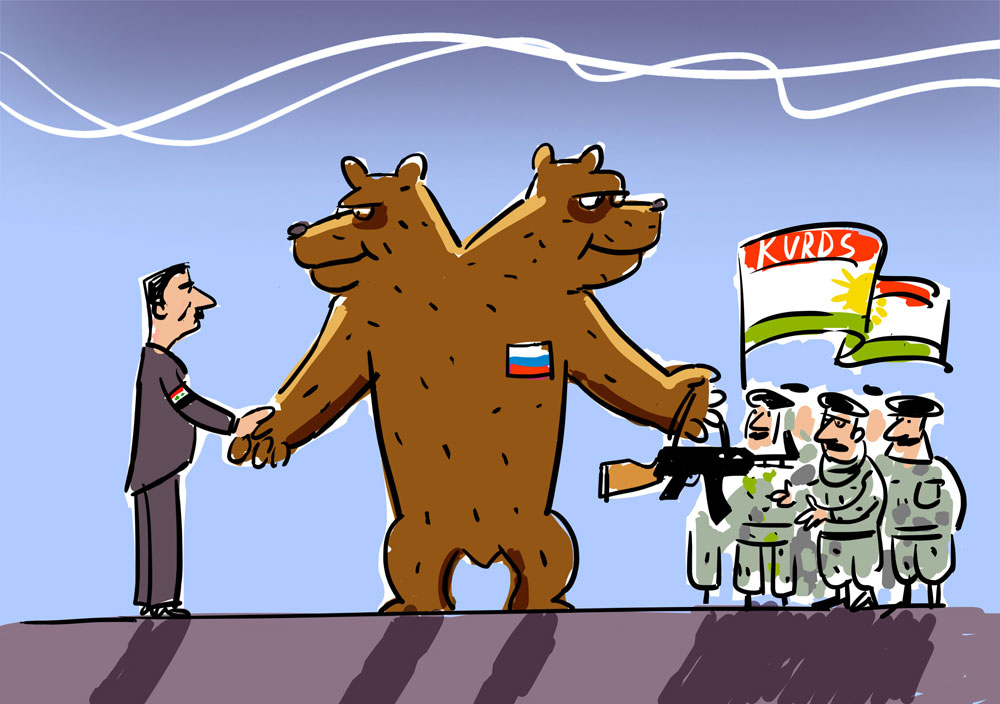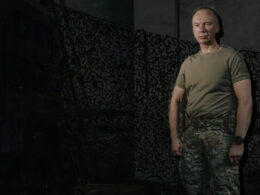
This is the text of an influential Russian political scientist, published by state news agency RIA Novosti. It describes what Russians should do in the case of victory over Ukrainian forces. We leave the conclusions to you.
RussiaVsWorld offers our readers a glimpse into the Russian propaganda machine. RIA Novosti is mainstream, not a fringe news outlet. We translate the article below as-is; we explain in [brackets] the Russian dog-whistle phrases and mark outright lies.
Term Nazi appears 82 times in the text. That’s because the propaganda tries to privatize the Allied victory over the Nazis just the way they had previously privatized oil and gas, pushing out the Native people of Siberia.
While the narrative focuses on Ukraine, the last paragraph ventures into portraying Putin’s Russia as a fighter for decolonization. This is perhaps to prepare a response to Canada that initiated the expulsion of Russia from G20.

by Timofey Sergeytsev [campaign manager, born 1963 in Ukraine, studied in Moscow, starting in the 2000s, he has been creating pseudo-historical documentaries about Ukrainian collaboration with Hitler]
Last April, we [RIA Novosti] did an article about the inevitability of the de-Nazifying of Ukraine. We do not need the Ukraine of the Nazi, of S.Bandera, that is the enemy of Russia and the tool of the West to destroy Russia. Today, the issue of de-Nazifying has moved into a practical plane.
De-Nazifying is necessary when a significant part of the people – most likely, the majority – have been sucked into the Nazi regime politically. That is, when the “people are good – the government is bad” hypothesis no longer works. Recognition of this fact is the basis of the policy of de-Nazifying, and of all de-Nazifying measures. The subject of de-Nazifying is the fact itself [i.e. “the people are bad,” the H1 hypothesis of this pseudo-scientific lingo].

Ukraine is in just such a situation. The fact that the Ukrainian voter elected the “peace of Poroshenko” and “peace of Zelenskyy” should not mislead us – the Ukrainians were quite satisfied with the shortest path to peace – through a blitzkrieg – that the last two presidents of Ukraine overtly hinted at when they got elected. They internalized the blitzkrieg approach for “pacifying” anti-Nazis by a total terror in Odesa, Kharkiv, Dnipropetrovsk, Mariupol, and other Russian cities. This was ok for a Ukrainian common voter.
[As to the reference to “Russian cities,” the Russian shauvenists present it as a fact that one-third of Ukraine where these cities – Odesa, Kharkiv, Dnipropetrovsk, Mariupol – are the regional centers was Russia and should belong to Russia]
De-Nazifying is the measure applied towards the masses of Nazi followers whom one is not able to subject to direct punishment as war criminals because of technicalities.
The Nazis who took up arms should be destroyed to the fullest on the battlefield. We should not differentiate between the Armed Forces of Ukraine, the so-called national battalions, and the Territorial Defense that joined either the Armed Forces or the national battalions.
[National battalions are volunteers who formed units in 2014 after the Putin-controlled president Yanukovych de-funded the Armed Forces. In 2014, the Russian propaganda was singling out the least numerous but eager-to-fight volunteers. After Yanukovych fled the country, the Armed Forces were rebuilt and integrated the national volunteers after rigorous personnel check, while the Territorial Defense was an asymmetric response to the likely Russian aggression by training people from among non-military cadre on the weekends close to their homes].
All of them are equally involved in extreme cruelty against the civilian population, equally guilty of the genocide of the Russian people, and do not comply with the laws and customs of war. War criminals and active Nazis should be punished extra harshly and demonstratively. There must be a total lustration with all organizations that have associated themselves with practicing Nazism to be liquidated and banned. Besides the top leaders, a significant part of the masses are guilty as accomplices of Nazism, the passive Nazis. They supported and indulged the Nazi power. The just punishment of this part of the population is possible through inflicting the unescapable hardships of our just war against the Nazi system, with careful and cautious relations towards other civilians when feasible. De-Nazifying the population further consists in re-education through an ideological repression (suppression) of Nazi attitudes and a strict censorship: not only in the political sphere, but also critically, in culture and education. It was culture and education that carried out a deep and massive Nazi conviction of the population, and secured internal violence and terror because of the prospective dividends from the Nazi regime victory over Russia, from Nazi propaganda, and from eight years of war with the people of Donbas who rebelled against the Ukrainian Nazism.
De-Nazifying requires winning, which means achieving the unconditional control over the de-Nazifying process and the government that maintains this control. Hence, a de-Nazifed country cannot be sovereign. Being the de-Nazifying country, Russia cannot practice a Liberal approach to de-Nazifying. The guilty party subjected to de-Nazifying cannot dispute our de-Nazifier’s purpose. Recognizing the need to de-Nazify means recognizing that an operation a la Crimea [in 2014] wouldn’t fly for the whole of Ukraine. Well, that wouldn’t fly even in 2014 and even in the rebellious Donbas. In Donbas, only eight years of hostility to the Nazi violence and terror resulted in the internal cohesion and a conscious unambiguous refusal en masse to maintain any solidarity and connection with the Nazi-self-identified Ukraine.
[Reference to Donbas relates here only to the criminal client states around Luhansk and Donetsk that are the temporarily-occupied territories of Ukraine. Nazi violence and terror is a false flag for the Russian occupation. In fact, after the occupation, the majority of the population fled to Ukraine, depopulating the area as opposed to making it “cohesive”].
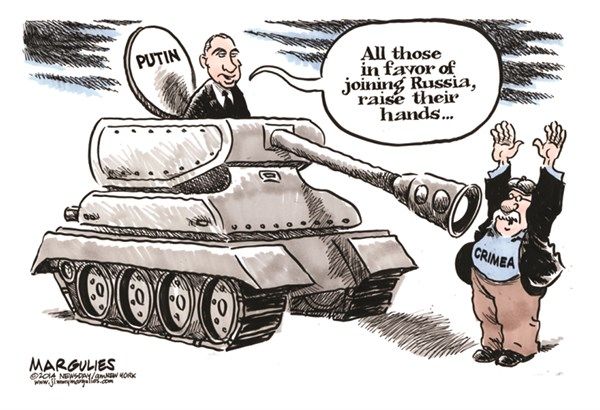
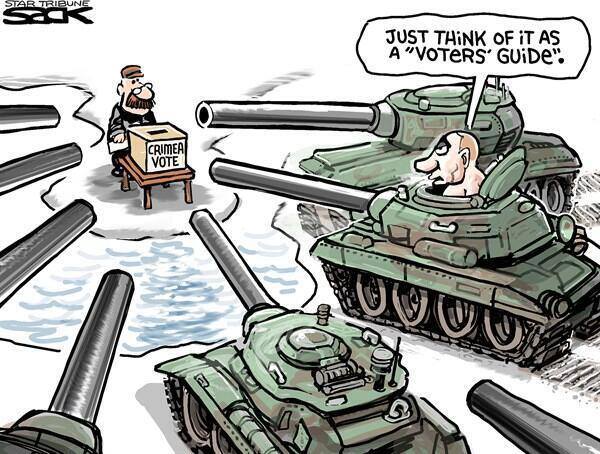
The de-Nazifying time frame is no less than one generation that needs to be born, brought up and to have reached maturity during the process of de-Nazifying. Ukraine’s Nazi attitudes have been present for over 30 years, beginning at least in 1989, when Ukrainian nationalism received legal and legitimate forms of political expression and led the “independence” movement towards Nazism.
[Independence was voted for several times in the parliament where the majority were members of the Communist Party of the Soviet Union, and sealed on a 1991 referendum supported by the overwhelming majority, including majority of Crimean voters].
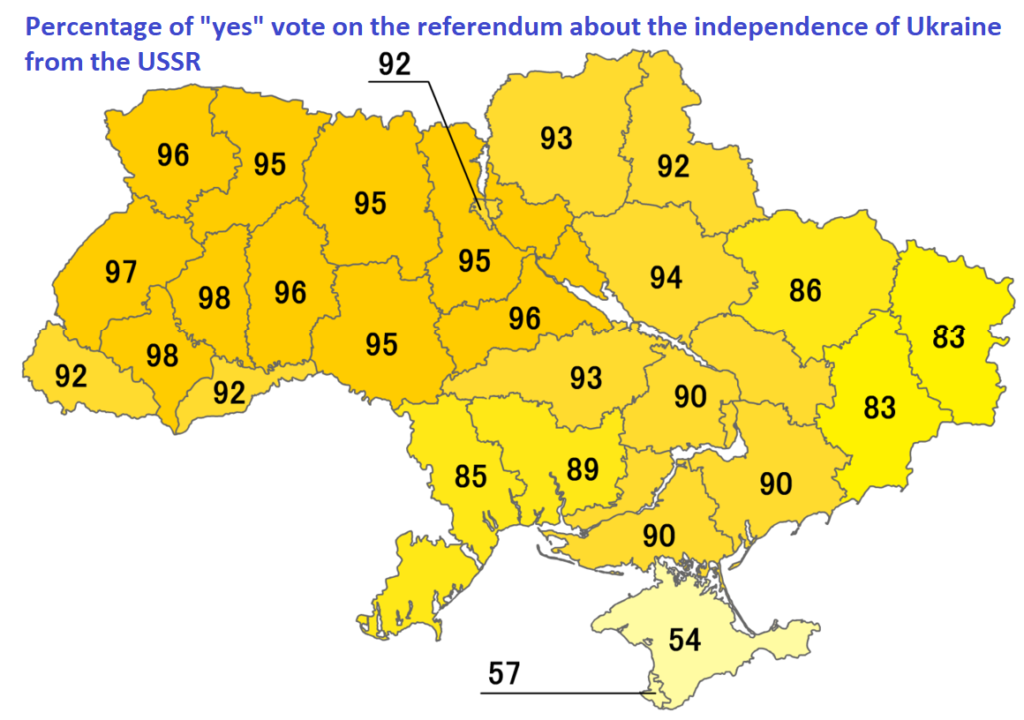
The peculiarity of modern Nazified Ukraine is in amorphousness and ambivalence, which make it possible to disguise Nazism as a desire for “independence” and a “European” (Western, pro-American) path of “development” (in reality – to degradation), to assert that in Ukraine “there is no Nazism, only private individual occurrences.” After all, there is no main Nazi party, no Fuhrer, no full-fledged racial laws (only their truncated version in the form of repressions against the Russian language). As a result, there is no opposition and resistance to the regime.
However, all of the above does not make the Ukrainian Nazism a “light version” of the German Nazism during the first half of the 20th century. On the contrary, since the Ukrainian Nazism is free of such “genre” frameworks and restrictions (essentially political campaign technology), it freely unfolds as the fundamental basis of any Nazism – as European and, in its most developed form, American racism. Therefore, de-Nazifying cannot be carried out halfway, based on a formula like “NATO – no, EU – yes.” The collective West itself is the designer, source and sponsor of the Ukrainian Nazism, while the Western cadres of S.Bandera and their “historical memory” are only one tool for turning Ukraine into Nazi sympathizers. Ukro-Nazi carries a greater, not lesser, threat to the world and to Russia than did the German Nazism a la Hitler.
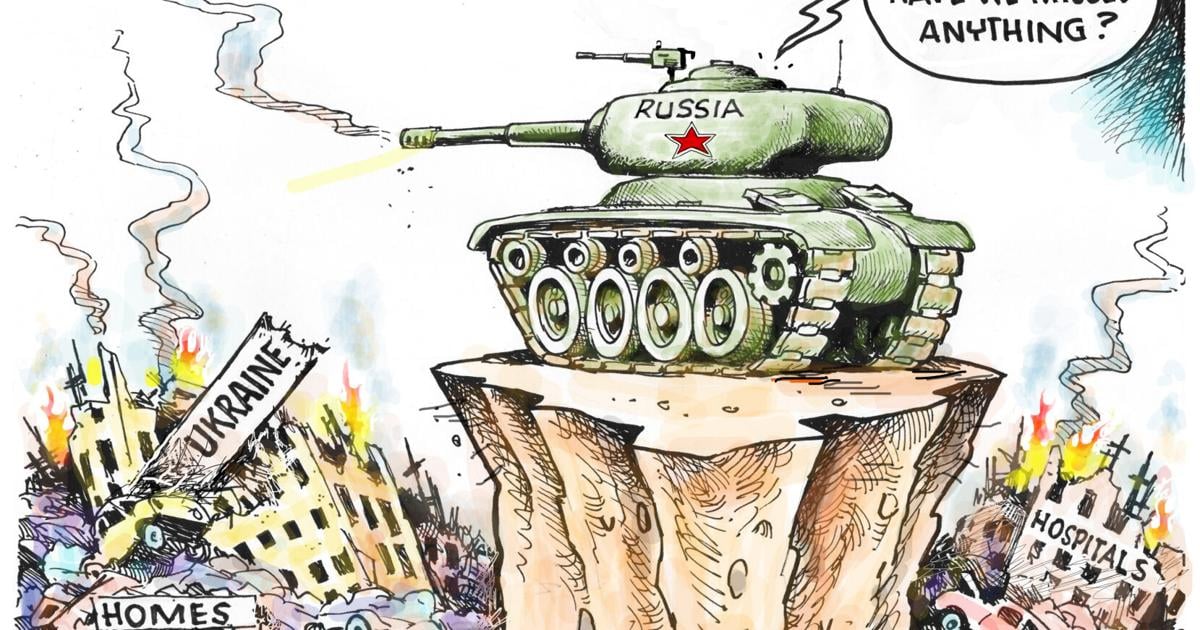
It appears that we won’t be able to retain the name “Ukraine” as the title of any fully de-Nazified state entity on a territory liberated from the Nazi regime. The newly created people’s republics in the space free from Nazism should and will develop from the starting point of practicing economic self-government and social security, restoration and modernization of the life support systems of the population.
Their political aspirations cannot be neutral – the expiation of guilt before Russia for treating it as an enemy can transpire through relying on Russia in the processes of restoration, revival and development. No “Marshall Plans” should be allowed for these territories. There can be no “neutrality” in the ideological and practical sense, compatible with de-Nazifying. The cadres and organizations that are the de-Nazifying instrument in the newly de-Nazified republics cannot but rely on Russia’s direct military and organizational support.
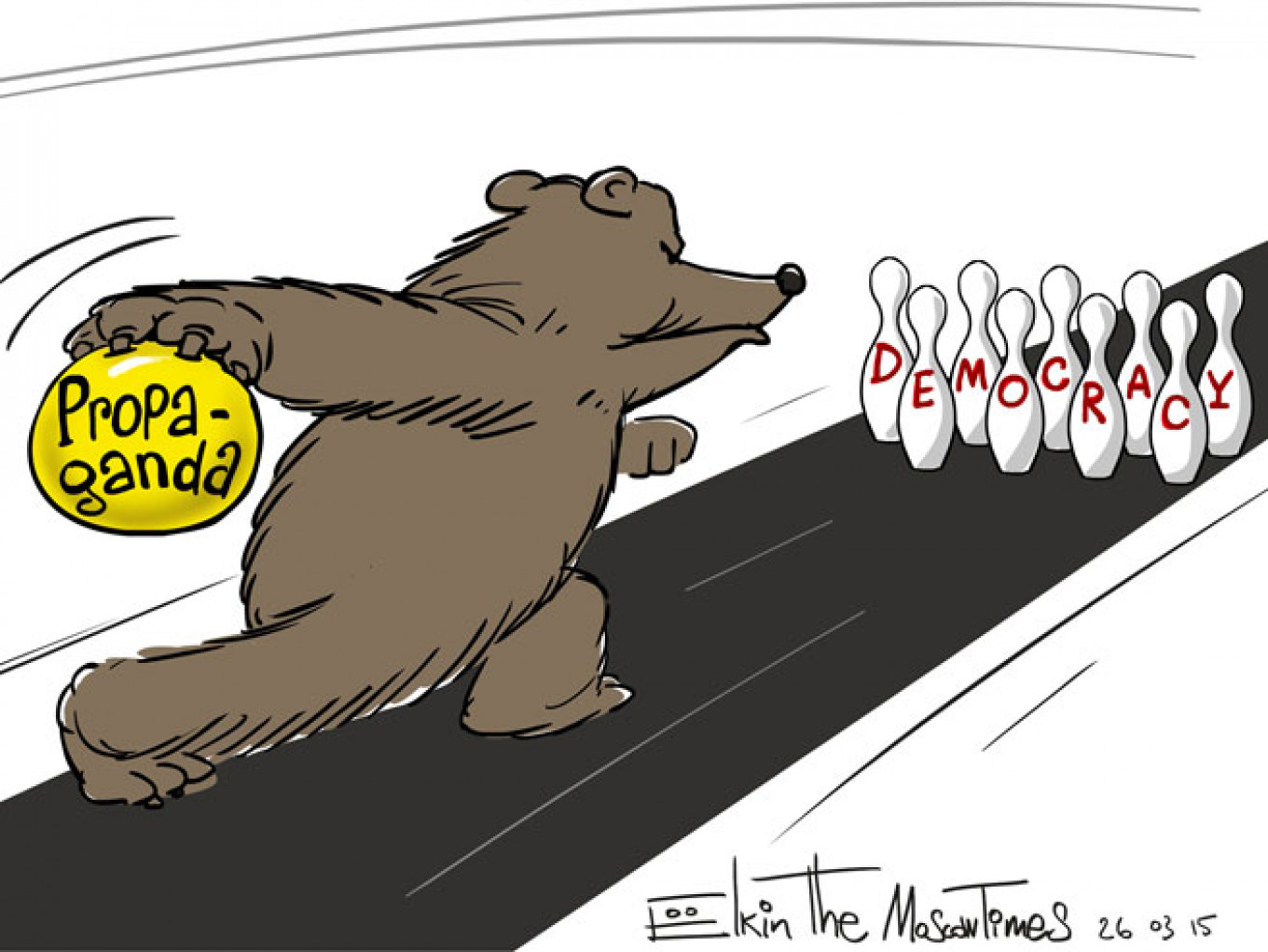
De-Nazifying will inevitably also be a de-Ukrainizing, i.e., rejecting the large-scale artificial overblowing of the ethnic component in self-identification of the population of the territories of the historical Minor Russia and New Russia. It was the Soviet authorities that began overblowing the ethnic component in self-identification. after the fall of the communist superpower, and being its instrument, the artificial ethnocentrism did not remain ownerless. In this official ca, it passed under the authority of another superpower (the power standing over the states) — the superpower of the West. It must be returned to its natural boundaries and deprived of political functionality.
As history has shown, Ukraine has been impossible as a nation state, unlike, say, Georgia and the Baltic countries. Attempts to “build” Ukraine naturally has led to Nazism. Ukrainism is an artificial anti-Russian construction that does not have its own civilizational
Unlike Georgia and the Baltic countries, Ukraine is impossible as a nation-state, as history has shown, and any attempts to “build” a nation-state naturally lead to Nazism. Ukrainism is an artificial anti-Russian construct that does not have its own civilizational content; it’s a subordinate element of an alien and unnatural civilization. Removing S.Bandera’s ideology by itself will not be enough for de-Nazifying because the S.Bandera narrative is jjust window-dressing for the European project of a Nazi Ukraine. Therefore, de-Nazifying Ukraine is also inevitably de-Europeanization.
The Bandera elite must be eliminated because its re-education is impossible. The social “swamp” that actively and passively supported the Bandera elite by action and inaction must survive the hardships of the war and get the experience as a historical lesson and atonement for its guilt. Those who did not support the Nazi regime, suffered from it and from the war unleashed by it in the Donbas, must be consolidated and organized, must become the pillar of the new government and its vertical and horizontal structures. Historical experience shows that the tragedies and dramas of wartime have benefited the peoples that had been tempted and carried away, taking on the role of a Russian enemy.
Within the framework of this operation, de-Nazifying as the goal of a special military operation includes
- a military victory over the Kyiv regime,
- the liberation of territories from the armed supporters of the Nazis,
- the elimination of implacable Nazis,
- the capture of war criminals, and
- the creation of systemic conditions for the subsequent de-Nazifying in peacetime.
In turn, the last item should begin with the organization of local self-government, police and defense bodies, cleansed of Nazi elements, launching on their basis the founding processes of founding a new republican statehood, integrating this statehood into a close cooperation with the Russian department for de-Nazifying Ukraine (newly created or converted, say, from RosSotrudnichestvo), with the adoption under Russian control of the republican regulatory framework (legislation) on de-Nazifying, the definition of the boundaries and framework for the direct application of Russian law and Russian jurisdiction on the liberated territory in the field of de-Nazifying, the creation of a tribunal for crimes against humanity in the former Ukraine. In this regard, Russia should act as the guardian of the Nuremberg Trials.
All of the above means that in order to achieve the de-Nazifying goals, the support of the population is necessary, its transition to the Russian side after liberation from terror, violence and ideological pressure of the Kyiv regime, after the withdrawal from informational isolation. Of course, it will take some time for people to recover from the shock of hostilities, to be convinced of Russia’s long-term intentions – that “they will not be abandoned.” It is impossible to foresee exactly in which territories such a mass of the population will constitute a critically needed majority. The “Catholic province” (Western Ukraine as part of five regions) is unlikely to become part of the pro-Russian territories, and the alienation line will be found empirically. Over the alienation line, Ukraine will remain hostile to Russia but forcibly neutral and demilitarized, with Nazism formally banned. The Russian haters will go there. The guarantee of the preservation of this residual Ukraine in a neutral state should be the threat of an immediate continuation of the military operation in case of non-compliance with the listed requirements. Perhaps this will require a permanent Russian military presence on its territory. From the alienation line to the Russian border there will be a territory of potential integration into Russian civilization, which is anti-fascist in its internal nature.
The operation to de-Nazify Ukraine, which began with a military phase, will follow the same logic of peacetime stages as the stages of the military operation. At each of them, it will be necessary to achieve irreversible changes, which will become the results of the corresponding stage. In this case, the necessary initial de-Nazifying steps can be as follows:
—liquidation of armed Nazi formations (i.e., any armed formations of Ukraine, including the Armed Forces of Ukraine), as well as the military, information, and educational infrastructure that ensures their activity;
—the formation of bodies of people’s self-government and the police (defense and law enforcement) of the liberated territories, protecting the population from the terror of underground Nazi groups;
—installation of the Russian information space;
—withdrawal of educational materials and prohibition of educational programs at all levels containing Nazi ideological guidelines;
– mass investigative actions to establish personal responsibility for war crimes, crimes against humanity.
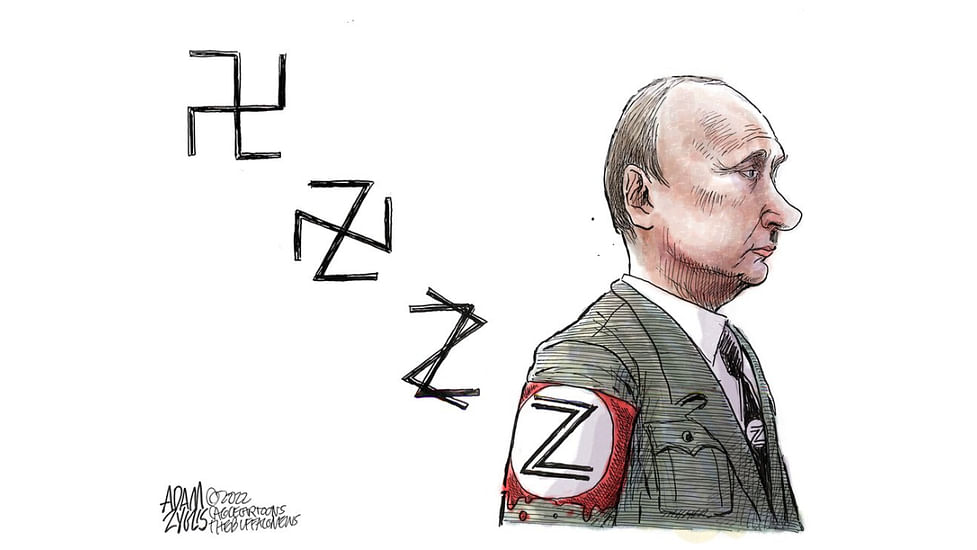
Russia will have no allies in de-Nazifying Ukraine. Hence, this is a purely Russian business. And also because not just the S.Bandera version of Nazi Ukraine will be eradicated, but above all, the Western totalitarianism, the imposed programs of civilizational degradation and disintegration, the mechanisms of subjugation to the superpower of the West and the United States.
In order to put the plan of de-Nazifying Ukraine into practice, Russia itself will have to finally part with pro-European and pro-Western illusions, fulfill itself as the last fortress of protecting and preserving the values of the historical Europe (the Old World) that deserve it and which the West ultimately abandoned, losing the fight for itself. This struggle continued throughout the 20th century and was expressed in the world war and the Russian revolution, inextricably linked with each other.
Russia did everything possible to save the West in the 20th century. Russia implemented the main Western project, an alternative to capitalism, which won the nation-states – a socialist, red project. It crushed German Nazism, a monstrous product of the crisis of Western civilization. The last act of Russian altruism was the hand of friendship reaching out Russia, for which Russia received a monstrous blow in the 1990s.
Everything that Russia has done for the West, it has done at its own expense, by making the greatest sacrifices. The West ultimately rejected all these sacrifices, devalued Russia’s contribution to resolving the Western crisis, and decided to take revenge on Russia for the help that it selflessly provided. Further, Russia will go its own way, not worrying about the fate of the West, relying on another part of its heritage – the leadership in the global process of decolonization.
As part of this process, Russia has a high potential for partnerships and allies with countries that the West has oppressed for centuries and which are not going to put on its yoke again. Without the Russian sacrifice and struggle, these countries would not have been liberated. The de-Nazifying of Ukraine is at the same time its decolonization, which the population of Ukraine will have to understand as it begins to free itself from the intoxication, temptation and dependence of the so-called European choice.

